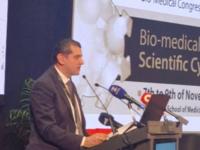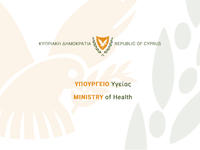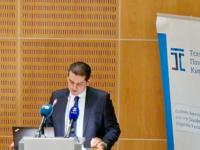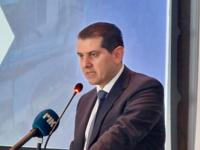Press Releases

29-04-2024 11:51
Welcome address by the Minister of Health, Mr Michael Damianos, at the 1st Regional Summit on Haemoglobin Disorders – Middle East and North Africa Region
It is truly an honour for me to address this “1st Regional Summit on Haemoglobin Disorders of the Middle East and North Africa Region”, convened by the Thalassaemia International Federation (TIF) and its Arab Thalassaemia Associations Forum. I extend my heartfelt thanks to the organisers for holding this important meeting in Cyprus, under my auspices, and welcome everyone to a country historically linked to thalassaemia.
Thalassaemia has been endemic in Cyprus for centuries, with the island having one of the highest rates of carriers and affected individuals in the world. As early as the 1960s, this severe form of anaemia was observed in many children in Cyprus but was of unknown origin, cause and clinical outcome and had, at the same time, severe medical, social and economic repercussions.
As a result of the extensive, collaborative efforts of the government, patients’ families, treating doctors, and the church, Cyprus managed to successfully address the multifaceted challenges posed by thalassaemia, transforming it from being a medical, social, and economic burden into a manageable condition.
The country is now spearheading actions aiming at improving the quality of life of patients, including through the establishment of the first globally National Thalassaemia Committee and the adoption of a National Thalassaemia Strategy, focusing on achieving further progress in the screening, prevention, and management of thalassaemia, including the provision of genetic counselling, prenatal screening, and advanced medical care to affected individuals. Initially chaired by the President of TIF, Mr. Englezos, and now by TIF’s Executive Director, Dr Androulla Eleftheriou, the National Thalassaemia Committee is the official, multi-stakeholder, consultative body of my Ministry on all matters that relate to thalassaemia.
Distinguished guests
Indeed, the country’s leadership in the field of thalassaemia could never be materialised without the contribution of the Thalassaemia International Federation, the only international, patient-led organisation having its headquarters in Cyprus, in recognition of the country’s efforts to control the disease and its strategic location, in the very middle of the so-called “thalassaemia belt” that includes areas of the Sub-Saharan Africa, the Mediterranean, the Middle East and Southeast Asia.
Allow me to commend the Federation for its unwavering commitment to the global fight against thalassaemia. Through its extensive network of 240 member organisations spanning more than 60 countries across all regions of the world, TIF has played a pivotal role in the diagnosis and treatment of thalassaemia globally, through very challenging times when knowledge and experience of how to effectively prevent and appropriately treat the disease were very confined to almost absent. TIF’s efforts and actions in advocating for policies and initiatives aimed at enhancing preventive measures and improving the quality of care for individuals affected by thalassaemia and other haemoglobin disorders worldwide have been instrumental in improving the length and quality of life of patients around the world.
In official relations since 1996 with the World Health Organization, TIF has managed to maximise the visibility of thalassaemia, provide guidance to affected countries, provide training opportunity to healthcare professionals and most importantly empower people with thalassaemia globally to fight for their right to quality healthcare, social and other support. A milestone of this collaboration and the result of a monumental effort has been TIF’s Global Thalassaemia Review, first published in 2021, that outlines the global thalassaemia landscape and highlights all existing inequalities. Furthermore, the Global Thalassaemia Review demonstrates the significant steps taken by many countries, to a greater or lesser extent based on national needs, resources and health priorities to address the multi-faceted challenges of thalassaemia and to alleviate the disease burden on the State, Healthcare System, the society as well as the individual and their family.
TIF’s Arab Thalassaemia Associations Forum, co-organising this very important meeting, has been created in the context of TIF’s efforts to fight against the health inequalities of the Arab-speaking countries, linked to Cyprus with a permanent bond of friendship.
Esteem Participants
Members of the Forum,
Please accept the sincerest congratulations of the Cyprus government and my Ministry, for taking note of the patients’ needs and taking decisive steps towards service improvement and the development of national programmes for thalassaemia control and management in your respective countries. In a world of unmet needs and huge inequalities, you have managed to utilise knowledge, capabilities and seek political will in an effort to positively affect the patients’ lives. Your Forum is invaluable to TIF which will continue to provide its patronage, auspices and support, to your countries, to the medical community, to each and every affected patient. It effectively demonstrates the importance to continue to address the patients’ unmet needs, by amplifying the voice of all relevant stakeholders and promoting disease specific policies based on TIF’s Guidelines and education programmes.
Last but not least, I am particularly pleased that the headquarters of the Thalassaemia International Federation are located in Cyprus, as TIF serves as a beacon of hope and a centre for global collaboration in the fight against thalassaemia. Therefore, it is my privilege to announce the government’s intention to formalise its relations with TIF through the signing of a memorandum of friendship and collaboration between the Ministry of Health and TIF further strengthening our partnership in this vital cause.
In conclusion, let us reaffirm our commitment to collaborative action in the fight against thalassaemia. Together, we can ensure a brighter future for individuals and families affected by this condition.
Thank you.
(NGian/NZ)
Relevant Press Releases







